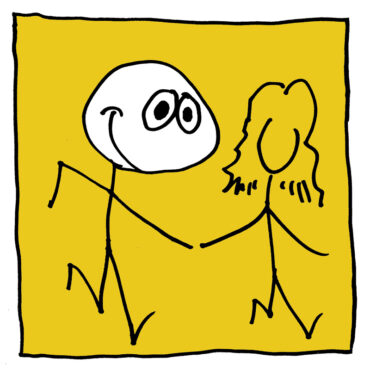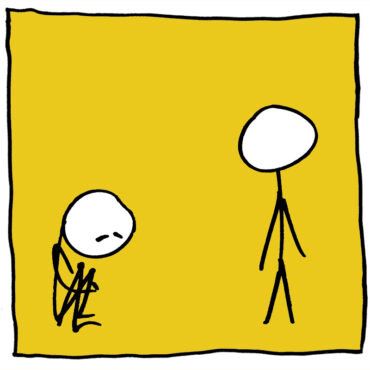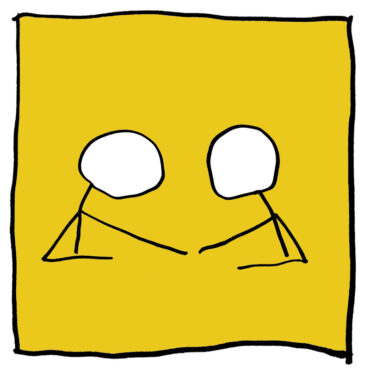
For most of my life I have been single, and so entering a long term relationship in my late 40s was a wonderful opportunity for practicing mindfulness amidst all the fear and nervousness. This was when I began my practical training in ‘clearly expressing needs and desires’. I’d told myself often enough that’s what I needed to learn. It said so in all the books I kept reading.
Up until now, however, I had been conspicuously lacking in someone to express myself to.
Finally I had found someone who I trusted enough to want to communicate my emotions to. I would ’speak my truth’ as they say. I figured it shouldn’t be too hard. I knew Kerry would respect and encourage my efforts and I genuinely believed it was a healthy thing to express myself emotionally like this.
Learning to communicate feelings clearly and without guilt or blame was a priority for both of us. We both knew it was what we needed to do in order to keep this relationship going, and both of us were very keen indeed to keep it going. I would start with the basics and focus on saying how I felt. I anticipated a steep learning curve but how hard could it be?
It was like pulling teeth.
Over the next few weeks as I tried to express emotions and needs and hopes all hell was breaking loose inside me. I had to resist my old habits and not go into denial or shutdown or make some terrible joke to deflect attention from my feelings. Intellectually I knew it was healthy and essential to express my feelings but in the moment it just felt so wrong, so dangerous.
I had some very, very deep inhibitions about opening up like this and my deep fears weren’t going down without a fight. They desperately resisted this bizarre urge to be vulnerable. To the old wounded parts of me all this ‘opening up’ felt like inviting bad old memories back to life. This felt scarier than suicide.

All that fear meant that there was a lot of anger flaring up at random moments and sometimes I had to abandon any pretence of being cool and go and fume somewhere for a while.
Kerry got to see me when I was in dark places, and she sat with me for as much as I could let her. Sometimes I simply had to be alone.
She had told me, when we had first met, that inner work was really important to her and now she walked her talk. She respected my issues and tried to help me sort them out when and where she could. If I couldn’t talk right away then she’d wait for me and when we could talk again we’d connect, debrief and start again.
Because I never developed the habit of emotional expression as a child I was now having to do so as an adult. Often I felt like a confused little boy, angry and upset. But Kerry kept encouraging me, and I kept coming back and trying.
I started to see the power of a relationship that genuinely valued emotional intelligence and emotional expression. Being upset and having someone I trusted enough to help me sit with the feelings was life changing.
I could face the awful monsters when she was with me and process the trauma as it was unfolding. This relationship was the ideal place for me to discover how to open up emotionally. I realised I really did have the perfect partner for doing some deep inner healing. It was like ongoing therapy, and I got to sleep with my therapist after our sessions.
How Wonderful!
That first year with Kerry was spent riding a lot of amazing highs and plummeting down into some truly awful experiences. As my mindfulness improved so did my sensitivity. This meant that I could feel the joys of love even more intensely, but I could also taste my depression more, and the sheer intensity robbed me of the will to live.
I see-sawed between wallowing in pleasure and marinating in anxiety. I felt like the world’s biggest drama queen just by stating calmly that I felt upset.
I overthought everything, wondering if even being in a relationship was a good idea for someone as profoundly messed up as me.
No one apart from Kerry saw this, usually. It was only with her that I could try and be open enough to be honest about uncomfortable feelings. Instead of my aussie-male persona of ‘Mr OK’, I was trying to learn how to express feelings and emotions, the sort of thing that is good to get out of your system when you’re a teenager. I didn’t. My childhood bullying and neglect had traumatised me into an emotional mute. If I wanted to go forward, that had to change.
In those first few weeks I kept subconsciously waiting for her to hurt me. For a snide word or a contemptuous laugh. For a strange look, a dismissive comment born of irritation. I was being vulnerable, and kept waiting for a bully to appear. It was something I knew in my bones: being vulnerable attracts teasing like moths to the flame. I realised I was waiting for a familiar family dynamic to play itself out.
But instead when Kerry was upset she’d talk to me about it, especially if I had triggered her. She’d explain what was happening for her without anger or blaming. She made it as easy as she could for me to understand how she was feeling. After a while I just started copying her. My emotional expression began by imitating my girlfriend and talking about how I felt just like she did. The behaviour she modelled was a vast improvement on the awkward, guilty silences of my childhood.
If one of us felt vulnerable we would tell the other about it, letting them know our emotional state. This was another kind of connection, one of emotional intimacy, where we simply and honestly stated our needs.
My partner listened to what I had to say and I listened to her, and it brought us even closer together. Maybe that sounds unremarkable to you but to me it was a strange, wonderful, life-changing experience.

Kerry was gentle and patient enough to coax my emotions out of the hiding places they had fled to long, long ago. She had her own demons to face too, of course, and I supported her just like she helped me. As Kerry and I connected I learnt to express myself (mostly), even when I was distressed. I learnt to state needs and desires (kind of). I started accepting myself as I was (sort of).
We had plenty of moments of being annoyed and upset with each other, but both of us had made a decision to not stay in those places, waiting to be rescued. We were in training to rescue ourselves, mentally and emotionally, and being in conscious relationship was another way of learning how to do that.
Kerry and I each had the discipline from the different training we’d done to recognise when we’d been triggered without blaming the other person. If I was angry, I reminded myself that it wasn’t with her. If she was upset, she didn’t become nasty or spiteful with me. This meant that we could support each other in moments of crisis, even if it happened to be one of us that had triggered the crisis in the first place.
If I was triggered by something Kerry had said or done I tried to express myself as politely as possible, rather than hide and fume silently. When Kerry heard and received my words calmly without reacting with fear or anger she was giving me the space I needed to cool down and become rational again.
I remember one evening in the kitchen when I had been triggered by something Kerry had done, and it was so trivial I can’t even remember what it was. At the time though I was so angry I was struggling to form coherent words to explain to her what had upset me. Kerry waited and told me to take my time, encouraging me through my frustration.
There I was, trying to calmly explain to my partner what she’d done to upset me, while she herself, right there in a rather tense moment, is encouraging me to verbalise my distress.
We’d talked before about inadvertently triggering each other, and how we could help support each other when that happened. Now in this moment of highly charged emotional energy we were both mindful enough to remember those good intentions and apply them.
It’s powerful therapy working with the person who has just triggered you; it’s risky but when it flows it really works. The woman who I was so enraged by a few minute ago had now become my angel of mercy. It was all good training in taking responsibility for my emotions instead of blaming someone else for how I feel and giving away all my power.
Instead of an argument or awkward silences we used non-violent communication; I told her I was angry, she told me she was nervous, and we took it from there.
My emotional mindfulness shot up a huge, wonderful, terrifying learning curve. It felt like a dam had burst inside me and now a flood of energy was pouring out. With mindfulness I could surrender to what I was experiencing, no matter how scary it sometimes felt. I knew that underneath all the fear was what I needed: connection. Being witnessed by someone I loved and witnessing them in turn was a great way to reconnect to life.
Eventually all that reconnection brought me into confrontation with my family culture, which I look at in the next extract.
Thank you for reading this extract. What was your reaction to it? If you’re in the mood and want to send me a comment please use the form below.
You can go to the next extract about dealing with my my family history!
Or you could check out my Patreon page.
Or you can return to the Extracts Index.
All text and images © The Mindfulness Poet
this chapter can be used in ‘marriage guidance’ training circles. I admire your frankness Brendan, opening up to vulnerability big time. Demonstrates courage.